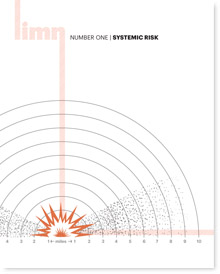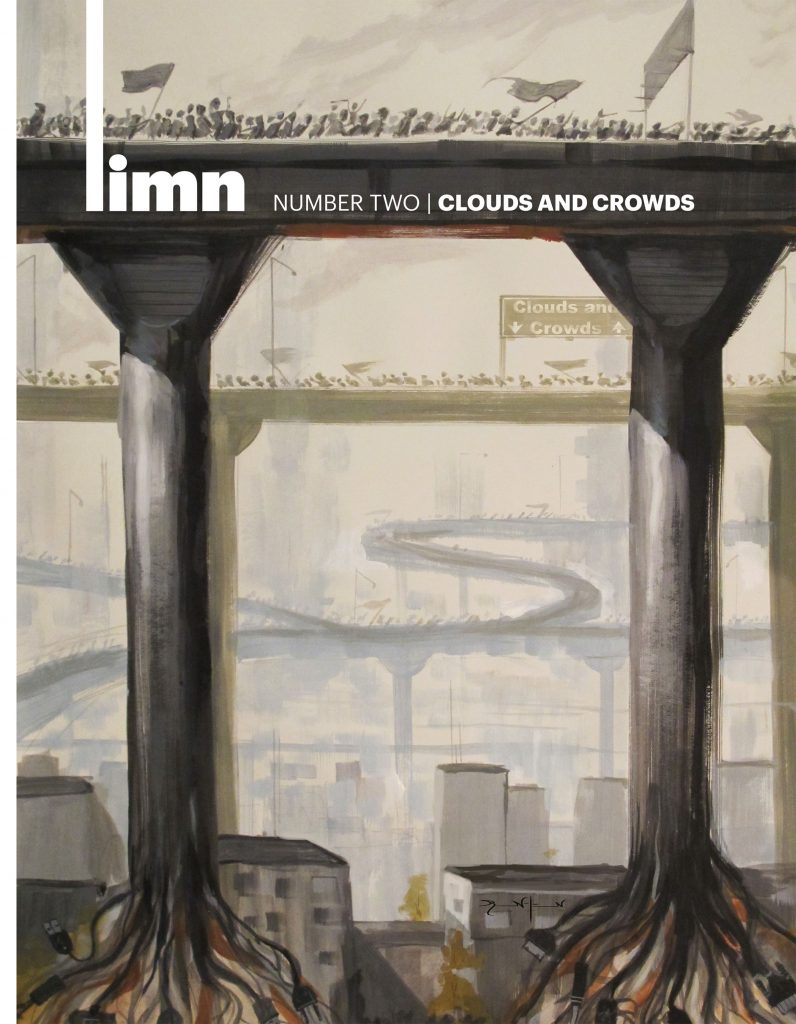Limn, 0-2: Prototyping Prototyping / Systemic Risk / Crowds and Clouds (2010-2012)
Filed under magazine | Tags: · big data, cloud computing, crowdsourcing, data mining, economy, financial crisis, internet, networks, politics, social media, surveillance

Limn, 0: Prototyping Prototyping, Nov 2010
“Before there was LIMN, there were several different prototypes. The first was occasioned by a conference: on prototypes. Held in Madrid in November of 2010, and organized by Adolpho Estalella and Alberto Corsín Jimenez, it was a conference for which this issue was imagined as a kind of pre-conference publication–another riff on the prototype. Many of the problems LIMN seeks to address were worked out in part through this conference and the publication: from the use of new media, to the function of conferences and conference papers, to the idea of a publication that precedes or determines a social event. Issue Number Zero was very much a prototype, and bears the traces of that concept and the discussion of it by the generous participants.”
Contributors: George Marcus, Marilyn Strathern, James Leach, Alberto Corsin Jimenez and Adolfo Estalella, Alex Wilkie, Nerea Calvillo, Javier Lezaun, Lucy Suchman, Lina Dib, Michael Guggenheim, Alain Pottage
HTML (updated on 2019-7-8)

Limn, 1: Systemic Risk, Jan 2011
“Systemic risk has become a central topic of expert discussion and political debate amidst the financial crisis that began in 2008, but it also has resonances across many other domains in which catastrophic threats loom – including internet security, supply chain management, catastrophe insurance, and critical infrastructure protection. In this issue, we invited scholars to contribute genealogical and conceptual framings that inform critical inquiry into this increasingly important concept. The result is not a traditional collection of academic articles but a set of brief, preliminary reflections, prepared on short notice, that address a common set of questions, along with a handful of documents, links, images and videos that illustrate different aspects of the concept.”
Contributors: Benjamin Sims, Deborah Cowen, Myriam Dunn Cavelty, Elizabeth Cullen Dunn, Christopher M. Kelty, Philip Bougen, Stephen J. Collier, Andrew Lakoff, Onur Ozgöde, Douglas R. Holmes, Rebecca Lemov, Brian Lindseth, Martha Poon, Grahame Thompson
HTML (updated on 2019-7-8)

Limn, 2: Crowds and Clouds, Mar 2012
“This issue of LIMN focuses on new social media, data mining and surveillance, crowdsourcing, cloud computing, big data, and Internet revolutions. Rather than follow the well-worn paths of argument typical today, our contributors address the problems in new ways and at odd angles: from the power and politics of statistics and algorithms to crowdsourcing’s discontents to the capriciousness of collectives in an election; from the focus group and the casino to the worlds of micro-finance and data-intensive policing. Together they raise questions about the relationship of technology and the collectives that form in and through them.”
Contributors: Christopher Kelty, Alain Desrosières, Lilly Irani, Chris Csikszentmihályi, Gabriella Coleman, Nick Seaver, Emmanuel Didier, Alek Felstiner, Tarleton Gillespie, Roma Jhaveri, Daniel Kreiss, Natasha Dow Schüll, Rebecca Lemov, Maria Vidart, Amira Pettus, Jonathan R. Baldwin, and Ruben Hickman
HTML (updated on 2019-7-8)
“Limn is somewhere between a scholarly journal and an art magazine. It is an attempt to communicate and display ongoing scholarly research. Limn outlines contemporary problems. It draws material from networks of experts in the social and human sciences and is intended to be timely, diverse in perspective, authoritative, well written and beautifully designed. The focus is on contemporary problems in our global, politically interconnected, technologically intense culture: problems of infrastructure, ecological vulnerability, economic interdependence, and relentless technological invention.”
Editors: Stephen J. Collier, Christopher M. Kelty, Andrew Lakoff
Creative Commons BY-SA 3.0 Unported License
Janet Byrne (ed.): The Occupy Handbook (2012)
Filed under book | Tags: · activism, business, debt, economy, money, occupy movement, politics, protest

“The Occupy Handbook pairs the most widely read and closely followed of the world’s economic, business, and cultural writers with the most popular protest movement in American history since the sea change of the 1960s: Occupy Wall Street.
Sixty-seven writers analyze the movement’s deep-seated origins in questions that the country has sought too long to ignore. The writers include Paul Krugman, Robin Wells, Michael Lewis, Paul Volcker, John Cassidy, Emmanuel Saez, Peter Diamond, Robert Reich, Daron Acemoglu, James A. Robinson, Amy Goodman, Jeff Madrick, Pankaj Mishra, Barbara Ehrenreich, Scott Turow, Carmen M. Reinhart, Kenneth S. Rogoff, Bethany McLean, Brandon Adams, Robert Shiller, Raghuram Rajan, Gillian Tett, Martin Wolf, Arjun Appadurai, Tyler Cowen, Felix Salmon, David Cay Johnston, Chris Hedges, David Graeber, and many others.
The Occupy Handbook captures the Occupy Wall Street phenomenon in all its ragged glory, giving readers an on-the-scene feel for the movement as it unfolds while exploring the heady growth of the protests, considering the lasting changes wrought, and recommending reform. A handbook to the occupation, The Occupy Handbook is a talked-about source for understanding why 1% of the people in America take almost a quarter of the nation’s income.”
Guest Editor Robin Wells
Publisher Back Bay Books / Little, Brown and Company, April 2012
ISBN 0316220213, 9780316220217
560 pages
MOBI (updated on 2012-6-13)
Comment (0)Tidal: Occupy Theory, Occupy Strategy, 2: Spring is Coming (2012)
Filed under magazine | Tags: · activism, debt, economy, money, occupy movement, politics, protest, theory

“We have spent the winter learning, working and growing. And now we are being propelled to bolder, more intelligent forms of resistance.
Our vision and alternatives will come in time, with patience, working together, when we reflect the strength and diversity of the 99%. Until then, let’s grow our power with each other against a government that’s no longer responsive to the will of the people it claims to represent.
We hope this Tidal ignites new conversations and deepens older ones amongst each other, in our assemblies, working groups, caucuses, universities, town halls, union halls, bars, bus stops, subway cars, shelters, dinner tables, and workplaces, in every spaces we occupy. The stakes are high enough that the conversations should happen everywhere. And perhaps the coming year will be the moment when we are unleashed beyond a ‘movement’ and towards a new way of being.” (Editorial statement)
Edited by Natasha Rosa Luxemburg, Amin Husain, Babak Karimi, and Laura Gottesdiener
Publisher Occupy Media, March 2012
32 pages
PDF, PDF (10 MB, updated on 2017-12-2)
Comment (0)
